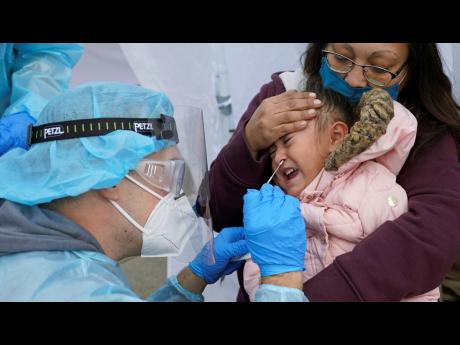Storage hurdle for COVID vaccine
A promise by pharmaceutical giant Pfizer to start distribution of its vaccine in the United States by December 2020 could be hampered because no country has the capacity to store the vaccine, the Pan-American Health Organization (PAHO) has said.
Assistant director of PAHO, Dr Jarbas Barbosa, urged nations to prepare their health infrastructure to store the vaccine at -70 degrees Celsius (-103 degrees Fahrenheit).
“There is no health system in the Caribbean, in South America, in the US, or in Europe that could be ready to handle those vaccines,” Barbosa told journalists at a PAHO press briefing on Tuesday.
“... So the manufacturer has reported a few days ago in a meeting we had with them that they are developing smaller equipment to transport these vaccines. Storage and transportation need to be -75.”
Pfizer’s announcement on Monday that its vaccine is more than 90 per cent effective in preventing COVID-19 has spurred global optimism in the face of a pandemic that has killed 1.3 million people and infected more than 52 million.
Barbosa said there are now 10 vaccines, including the Pfizer prototype, currently at the final stage of clinical trials.
OTHER HURDLES
Two or three vaccines will require cold storage because they use the genetic material of the virus. But even after completing phase three, there are still other hurdles to clear before they can be made available to the public.
“Some of them are close to the end of this trial. After the end, they will need to publish not a summary, but they will need to publish in scientific journals all the data so the scientific community can double-check all the data very carefully,” said Barbosa.
Findings should also be presented to the regulatory authorities.
“Hopefully, we will have a vaccine available in the first semester 2021,” he said.
Although PAHO has partnered with the Caribbean Public Health Agency to secure down payments to purchase over one million doses of COVID-19 vaccines for Caribbean member states, Dr Marcos Espinal, director of the Department of Communicable Diseases at PAHO, said countries have already started bilateral discussions with Pfizer to access the vaccine. These countries include Chile, Argentina, Mexico, Peru, and Brazil.
Vaccines secured through PAHO will be purchased through Gavi, the Vaccine Alliance, which is the administrator of the COVAX Facility. Jamaica has already secured 100 per cent of the down payment required.
“The advantage of using the COVAX facility is that there are several vaccines that will be available,” Espinal said.
Barbosa said that PAHO and UNICEF would be receiving information from the producers about the vaccines, including the costs.
“In Jamaica, we are very active in different negotiations as well as all the Caribbean countries,” he said.

